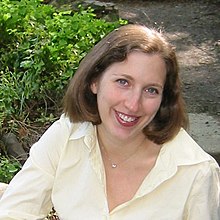Dara Horn
Jump to navigation
Jump to search

Dara Horn (born 1977) is an American novelist, essayist, and professor of literature. She has written five novels and in 2021, released a nonfiction essay collection titled People Love Dead Jews, which was a finalist for the 2021 Kirkus Prize in nonfiction. She won the Edward Lewis Wallant Award in 2002, the National Jewish Book Award in 2003 and 2006, and the Harold U. Ribalow Prize in 2007.
Quotes[edit]
2014–2021[edit]
- It reminds me of that anemic element of the way I grew up in a community where it was like, here’s Jewish history: There was a shtetl, and there was a Holocaust, and now there’s Israel.
- Interview with Tablet (2014)
- You can’t write without inventing.
- Interview with Tablet (2014)
- [M]y question is, what are the ways that we might be erasing ourselves to make other people comfortable?... [W]e are so often asked to erase ourselves too, and to devote ourselves to making other people comfortable. Is there a way that making people uncomfortable could make all of us be more able to flourish?
- [W]hen a young employee at the Anne Frank House in 2017 tried to wear his yarmulke to work, his employers told him to hide it under a baseball cap. The museum's managing director told newspapers that a live Jew in a yarmulke might "interfere"” with the museum's "independent position." The museum finally relented after deliberating for six months, which seems like a rather long time for the Anne Frank House to ponder whether it was a good idea to force a Jew into hiding.
- "Becoming Anne Frank", Smithsonian Magazine (November 2018)
- From an essay reprinted in People Love Dead Jews
Interview with Jewish Women's Archive (2018)[edit]
- The desire for immortality usually comes from a desire to fulfill one’s ambitions, but women’s lives have traditionally been focused not on ambition, but on obligation. So while immortality might be attractive to a man who sees it as a way to fulfill endless ambitions, an immortal woman in most historical periods would more likely be thinking, “Seriously? I have to do all that AGAIN?”
- My understanding of romantic relationships in literature, where men endlessly pursuing women is regarded as idealistic and romantic, whereas women endlessly pursuing men is regarded as pathetic.
- Judaism is much bigger on commitment than fulfillment.
People Love Dead Jews: Reports from a Haunted Present (2021)[edit]
- I had mistaken the enormous public interest in past Jewish suffering for a sign of respect for living Jews. I was very wrong. This fact should have been obvious to me from the beginning of my writing career, when my most acclaimed early published piece, the one nominated for a major award, wasn't the one about Jewish historical sites in Spain but rather the one about death camps. I made a point of resisting this reality, asking people at my public talks if they could name three death camps, and then asking the same people if they could name three Yiddish authors-the language spoken by over 80 percent of death-camp victims. What, I asked, was the point of caring so much about how people died, if one cared so little about how they lived? (Introduction)
- "Censorship" is beside the point, the insane extremes of "cancel culture" extravagantly irrelevant, because this double helix of hate and art is built into our world. ("Commuting with Shylock")
2024–present[edit]
- The righteous fight for justice therefore does not require protecting Jews as a vulnerable minority. Instead it requires taking Jews down.
This idea is tacitly endorsed by Jews' bizarre exclusion from discussion in many DEI trainings and even policies, despite their high ranking in American hate-crime statistics. The premise, for instance, that Jews don't experience bigotry because they are "white," itself a fraught idea, would suggest that white LGBTQ people don't experience bigotry either—a premise that no DEI policy would endorse (not to mention the fact that many Jews are not white).- "Why the Most Educated People in America Fall for Anti-Semitic Lies", The Atlantic (February 15, 2024)
